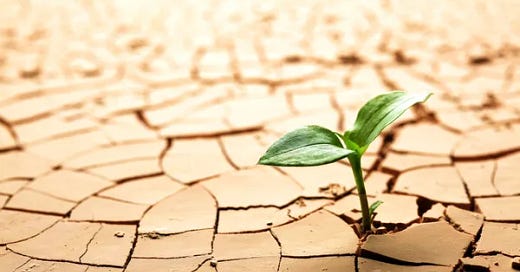Why is a venture capital firm talking about resilience?
We believe that in the world of startups there are two connected outcomes.
The first is the business outcome. (We are very good at measuring this - think exit valuation, ARR, IRR, ROI, CAC, etc…)
The second is what we call the founder outcome. We believe this side of the outcome equation is far more important. No doubt, this is harder to measure, but perhaps we could look at “metrics” like quality of mental health, relationships with family, physical fitness just to name.
At 11 Tribes Ventures, we invest to optimize for founder outcomes.
And the irony is - the more we invest in our founders as people, as humans, our portfolio will be characterized by more successful business outcomes too. Is your mind blown yet, anyone? 🤯
The cold reality of startups is that building them is really, really hard. Period. I failed in my first attempt to build a healthcare startup. But the most important thing I learned is that failure is not fatal.
So in order to optimize for founder outcomes (through failure and success), we need to empower our founders with a bounce-back reflex: a reflex that activates when the 4 Rights of a Resilience Regimen are in place:
Right people
Right mindset
Right habits
Right plan.
We’ve already discussed the importance of the right people: knowing your “who” and surrounding yourself with truth-speaking advisors and mentors.
Now, let’s talk about the second of resilience’s “4 Rights” – the right mindset: a growth mindset.
Just because founders think big doesn’t mean they possess a growth mindset.
Think big ≠ growth mindset
Founders can be rigid – their way or the highway. A fixed mindset rarely benefits anyone, and often leads to frustration and alienation.
Rather, a growth mindset is ongoing and dynamic. Like resilience, a growth mindset is a skill you practice, a garden you cultivate, a muscle you build.
A growth mindset is what ignites your bounce back reflex.
What is a growth mindset not?
It is not arrogant or “know it all.”
It is not based on fear or guilt.
It is not inconsistent.
Rather, someone with a growth mindset…
… asks for and thrives on feedback from their “who. “
… is in a constant state of learning, pouring into themselves to learn and grow.
… is willing to take risks, knowing that in a founder’s world, failure & risk coexist.
… is disciplined and accountable, but not rigid.
Here are a few ideas of things you can do to develop and nurture a growth mindset.
Your “Who” Influence Your Mindset
Your “Who” strengthens your growth mindset. They ask the tough questions. They hold you accountable. You listen. You learn.
Our advice: boldly ask them questions. Listen. Learn.
Nurture Your Mindset: Invest Into Yourself
Founders initiate transformation, and yet, to transform, a constant renewal of mind is required. Founders can excel at investing into others (their team, customers, investors) but often, they lapse at investing into themselves.
Investing into yourself, nurtures your growth mindset.
Be Careful What You Tell Yourself
Failure is part of the founders’ journey.
Fail fast. Take insight. Move on.
Guilt is never productive and it impedes a growth mindset. Instead --
Practice Gratitude
Gratitude cultivates a growth mindset.
It’s proven: Gratitude rewires your mind.
Gratitude is the antidote to adversity and failure.
Sometimes, when things aren’t going as planned, it is challenging to practice gratitude. When this is the case, get granular. Be grateful for green traffic lights when driving to the office. Be grateful for your good health. Be grateful for the family and friends that love and support you.
It’s hard to know what comes first: Resilience or a growth mindset.
But one thing is for sure – you can’t have one without the other.



